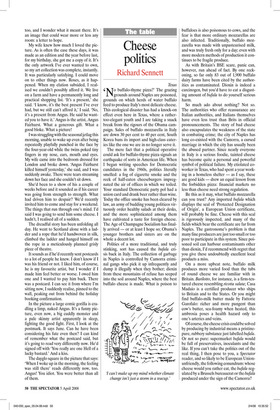Cheese politics
Richard Sennett
Texas ‘No buffalo-thyme pizza?’ The grazinggrounds around Naples are poisoned, grounds on which herds of water buffalo feed to produce Italy’s most delicate cheese. This ecological disaster has had a knock-on effect even here in Texas, where a rathertoo-elegant youth and I are taking a snack break from the rigours of the Obama campaign. Sales of buffalo mozzarella in Italy are down 30 per cent to 40 per cent, South Korea bans its import and high-class eateries like the one we are in no longer serve it.
The mere fact that a political operative could ask for buffalo-thyme pizza signals an earthquake of sorts in American life. When I began writing speeches for Democratic candidates in the 1960s, politics literally smelled: a fog of cigarette smoke and the reek of half-eaten cheeseburgers impregnated the air of offices in which we toiled. Your standard Democratic party pol had a union card and drank beer rather than wine. Today the office smoke has been cleared by law, an army of budding young politicos virtuously order healthy salads at their desks, and the more sophisticated among them have cultivated a taste for foreign cheese. The Age of Champagne Socialism has finally arrived — or at least I hope so; Obama’s younger brothers and sisters are on the whole a decent lot.
Politics of a more traditional, and truly stinking, sort has caused the bufala crisis back in Italy. The collection of garbage in Naples is controlled by Camorra criminal gangs who pick it up infrequently and dump it illegally when they bother; dioxin from these mountains of refuse has seeped into the soil around Naples, where the best buffalo cheese is made. What is poison to buffaloes is also poisonous to cows, and the fear is that more ordinary mozzarellas are also infected. Traditionally, buffalo mozzarella was made with unpasteurised milk, and was truly fresh only for a day; even with more modern methods of production it continues to be fragile produce.
As with Britain’s BSE scare, panic can, however, run ahead of fact. By one reckoning, so far only 83 out of 1,900 buffalo dairy farms have been cited by the authorities as contaminated. Dioxin is indeed a carcinogen, but you’d have to eat a disgusting amount of bufala to do yourself serious harm.
So much ado about nothing? Not so. The authorities who offer reassurance are Italian authorities, and Italians themselves have even less trust than Brits in official pronouncements. The story of bad cheese also encapsulates the weakness of the state in combating crime; the city of Naples has long co-existed with the Camorra, a cursed marriage in which the city has usually been the abused partner. Since nearly everyone in Italy is a serious foodie, tainted cheese has become quite a personal and powerful symbol of political failure. My etiolated coworker in Texas, who had spent a year working in a homeless shelter — as I say, these are good kids — drew an equal lesson from the forbidden pizza: financial markets no less than cheese need strong regulation.
Be this as it may, what buffalo mozzarella can you trust? Any imported bufala which displays the seal of ‘Protected Designation of Origin’, a European Union certificate, will probably be fine. Cheese with this seal is rigorously inspected, and many of the fields which bear the certificate are far from Naples. The gastronome’s problem is that many fine producers are just too small or too poor to participate in this system. Since poisoned soil can harbour contaminants other than dioxin, I’d recommend with regret that you give these undoubtedly excellent local products a miss.
On a more upbeat note, buffalo milk produces more varied food than the tubs of round cheese we are familiar with in Britain. Barilotto, for instance, is a firm-textured cheese resembling ricotta salata; Casa Madaio is a certified producer who ships to Britain and to the States. Or you might find buffalo-milk butter made by Fattorie Garofalo: richer and more pungent than cow’s butter, sea-foamy when heated, this ambrosia poses a health hazard only to one’s arteries and veins.
Of course, the cheese crisis could be solved by producing by industrial means a pristinepure, rubbery substance just labelled bufala. Or not so pure: supermarket bufala would be full of preservatives, inoculants and the like. If you can’t take the politics out of the real thing, I then pose to you, a Spectator reader, and so likely to be European Unionunfriendly, the following conundrum: whose cheese would you rather eat, the bufala regulated by a Brussels bureaucrat or the bufala produced under the sign of the Camorra?


































































 Previous page
Previous page